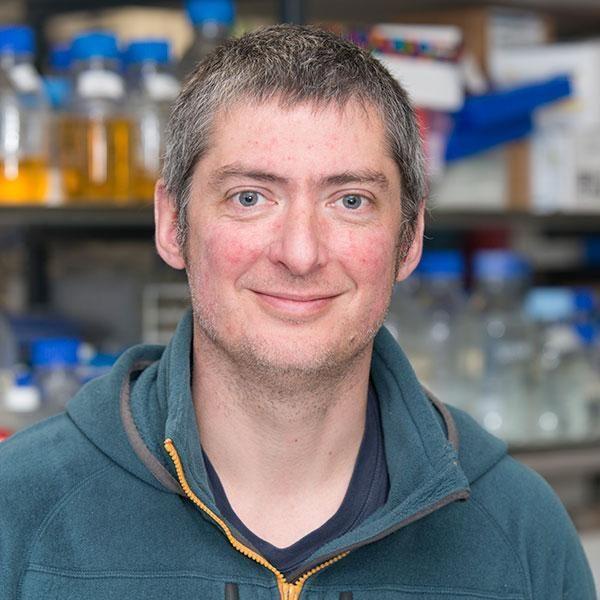Research Focus
Our group studies changes in metabolism and metabolic stresses that are caused by oncogene activation and how these stresses lead to tumour suppressive responses.
Key Publications
Major Funding
- 2017-2022- Wellcome Multi User Equipment Grant : High resolution metabolite and peptide mass spectrometry, £778,000
- 2014-2015- Wellcome Trust ISSF, Mass spectrometry development, £78,000
- 2013-2018- University of Edinburgh Chancellor’s Fellowship, £668,000
Other Activities
- Secretary of the Scottish Metabolomics Network (2015-2019)
Themes/Keywords
Research
Cells take up nutrients to meet their energetic and biosynthetic requirements and the balance between nutrient uptake and usage is a carefully controlled process. Thus when individual nutrients are in short supply, cells alter their metabolism to reduce consumption of that nutrient. This is a good example of cellular homeostasis - ‘the tendency towards a relatively stable equilibrium between interdependent elements, especially as maintained by physiological processes.'
Cancer cells usually have biosynthetic demands that are elevated and altered compared to those in normal cells. The proto-oncogenes Myc and Ras are strong drivers of growth and proliferation through activation of target genes and signalling pathways that activate processes such as ribosome and mitochondrial biogenesis, lipid synthesis and the cell cycle. However, when they are deregulated/activated they promote uncontrolled demand for nutrients and energy that may not always be met by supply, giving rise to metabolic stresses.
Our lab primarily studies metabolic stresses that accompany oncogene activation and how the cell responds to those stresses. We hope that by understanding these processes, we will reveal nodes of metabolic regulation that can be targeted to develop new cancer therapies.
Other Activities
- Secretary of the Scottish Metabolomics Network (2015 - 2019)
Major Funding
- 2017-2022- Wellcome Multi User Equipment Grant : High resolution metabolite and peptide mass spectrometry, £778,000
- 2014-2015- Wellcome Trust ISSF, Mass spectrometry development, £78,000
- 2013-2018- University of Edinburgh Chancellor’s Fellowship, £668,000
Recent Publications
Spotlight on New Therapeutic Opportunities for MYC-Driven Cancers D’Avola A, Kluckova K, Finch AJ et al. OncoTargets and Therapy 16(10) 371-383
O20 TARGETING THE DEFECTIVE COA PATHWAY TO IMPROVE ERYTHROPOIESIS IN SF3B1-MUTANT MDS-RS PATIENTS Philippe C, Mian S, Maniati E et al. Leukemia Research (2023) 128(10) 107133
Regulation of Cyclooxygenase 2 mRNA Stability by the Mitogen-Activated Protein Kinase p38 Signaling Cascade Lasa M, Mahtani KR, Finch A et al. Molecular and Cellular Biology (2000) 20(10) 4265-4274
Acute Overexpression of Myc in Intestinal Epithelium Recapitulates Some but Not All the Changes Elicited by Wnt/β-Catenin Pathway Activation Finch AJ, Soucek L, Junttila MR et al. Molecular and Cellular Biology (2009) 29(10) 5306-5315
Vitamin B5 and succinyl-CoA improve ineffective erythropoiesis in SF3B1-mutated myelodysplasia Mian SA, Philippe C, Maniati E et al. Science Translational Medicine (2023) 15(10) eabn5135-eabn5135
Inhibition of Stearoyl-CoA Desaturase Has Anti-Leukemic Properties in Acute Myeloid Leukemia Dembitz V, Lawson H, Philippe C et al. Blood (2022) 140(10) 3058-3060
Reversal of mitochondrial malate dehydrogenase 2 enables anaplerosis via redox rescue in respiration-deficient cells Altea-Manzano P, Vandekeere A, Edwards-Hicks J et al. Molecular Cell (2022) 82(10) 4537-4547.e7
Hypoxia-driven metabolic reprogramming of adipocytes fuels cancer cell proliferation Aird R, Wills J, Roby KF et al. Frontiers in Endocrinology 13(10) 989523
MYC sensitises cells to apoptosis by driving energetic demand Edwards-Hicks J, Su H, Mangolini M et al. Nature Communications 13(10) 4674
The hepatic compensatory response to elevated systemic sulfide promotes diabetes Carter RN, Gibbins MTG, Barrios-Llerena ME et al. Cell Reports (2021) 37(10) 109958
For additional publications, please click hereTeam
Postdoctoral ResearchersBiography
I did my PhD with Jerry Saklatvala at the Babraham Institute and then the Kennedy Institute of Rheumatology in Hammersmith, studying protein kinases activated by interleukin 1. After my PhD, I went to work with Gerard Evan at the UCSF Cancer Center (in San Francisco) on mechanisms of oncogene-induced tumour suppression. During this period, I developed my interests in apoptosis, tumour suppression and homeostasis and I realised that cellular metabolism was a likely key contributor to these processes. I returned to the UK to work with Alan Warren at the MRC Laboratory of Molecular Biology (LMB) in Cambridge where I studied a disorder of ribosome biogenesis called Shwachmann Diamond Syndrome.
Since setting up my lab in 2013 at the Cancer Research UK Edinburgh Centre (part of the Institute of Genetics and Molecular Medicine, IGMM), I have focused upon metabolic stresses elicited by oncogene activation and how they lead to tumour suppressive outcomes (including apoptosis and senescence). I set up the mass spectrometry capability at the IGMM and developed my metabolic/metabolomic and lipidomic expertise there.
I joined Barts Cancer Institute in Jan 2020.

